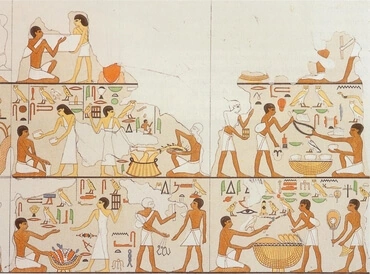6078. 'For there is no pasture for the flock which belongs to your servants' means that factual knowledge holding forms of the good of truth is wanting. This is clear from the meaning of 'pasture for the flock' as factual knowledge holding forms of the good of truth, so that 'no pasture' means factual knowledge that does not hold any forms of the good of truth. In the internal sense 'pasture' is that which supports spiritual life; in particular it is truth contained in factual knowledge, for the human soul desires such truth just as the body desires food. Nourishment is derived from it, and for that reason 'feeding' means receiving instruction, 5201. That factual knowledge and truths sustain the human soul is quite evident from a person's desire for knowledge, as well as from the correspondence of food with factual knowledge, 1480, 3114, 4792, 5147, 5193, 5340, 5342, 5576, 5579, 5915. This correspondence also manifests itself when a person is eating food. If he eats it while talking and listening the vessels that receive the chyle are opened, and he is nourished more fully than if he is alone. Spiritual truths and instruction in them would have the same kind of effect on people if they were to have an affection for what is good. The fact that truths nourish spiritual life is revealed primarily among good spirits and among angels in heaven. Those spirits and angels have a constant desire to acquire knowledge and wisdom; and when they lack this spiritual food they feel desolate, listless, and famished. Nor are they refreshed and raised into the bliss of their life until their desires are satisfied. But if that factual knowledge is to yield the soul wholesome nourishment, that knowledge must contain life received from forms of the good of truth. If it does not contain life received from them factual knowledge still sustains a person's inner life, but his natural life, not his spiritual life.
[2] The meaning of 'pasture' in the internal sense as that which sustains a person's spiritual life is also evident from other places in the Word, as in Isaiah,
I have given you as a covenant to the people, to restore the land; to say to the bound, Go out, to those who are in darkness, Reveal yourselves. They will feed along the ways, and on all slopes will their pasture be. Isaiah 49:8-9.
'Feeding along the ways' stands for receiving instruction in truths, 'the ways' being truths, see 627, 2333, and 'feeding' receiving instruction, 5201. 'On all slopes will their pasture be' stands for being sustained with good, for 'slopes', like 'mountains' are forms of the good of love, 795, 796, 1430, 2722, 4210.
[3] In Jeremiah,
Woe to the shepherds destroying and scattering the flock of My pasture. Jeremiah 23:1.
'Pasture' stands for the kinds of things that sustain spiritual life. In the same prophet,
The princes of Zion have become like deer, they have not found pasture. Lamentations 1:6.
'They have not found pasture' stands for no truth of good.
[4] In Ezekiel,
I, even I will look for My sheep. I will feed them in a good pasture, and their fold will be on the mountains of the loftiness of Israel; there 1
they will lie down in a good fold, and on fat pasture they will feed upon the mountains of Israel. Ezekiel 34:11, 14.
'A good and fat pasture upon the mountains of Israel' stands for forms of the good of truth. In the same prophet,
Is it a small thing to you? You feed off the good pasture but tread down with your feet the rest of your pastures. Ezekiel 34:18.
Here the meaning is similar. In Hosea,
I knew you in the wilderness, in the land of drought. When [they had] their pasture, they were filled; they were filled and their heart was exalted. Hosea 13:5-6.
In Joel,
The beasts groan, the herds of cattle are perplexed because they have no pasture, even the flocks of sheep 2
are made desolate. Joel 1:18.
In David,
Jehovah is my Shepherd; He will make me lie down in green pasture; 3
He will lead me away to still waters; He will restore My soul. Psalms 23:1-3.
In the same author,
Jehovah made us and not we ourselves, His people and the flock of His pasture; therefore we are His, His people, and the flock of His pasture. 4
Psalms 100:3.
[5] 'Pasture' in these quotations stands for the truths in which a person receives instruction, here the kinds of things which have regard to spiritual life. For the nature of spiritual life is such that if it lacks that pasture it languishes and so to speak fades away, like the body when it lacks food. The fact that 'pasture' is the goodness and truth that refresh and sustain a person's soul or spirit is plain from the Lord's words in John,
I am the door. If anyone enters through Me he will be saved, and will go in and out, and find pasture. John 10:9.
'Pasture' stands for the forms of good and the truths which those people have who acknowledge the Lord and seek life from Him alone.
Footnotes:







